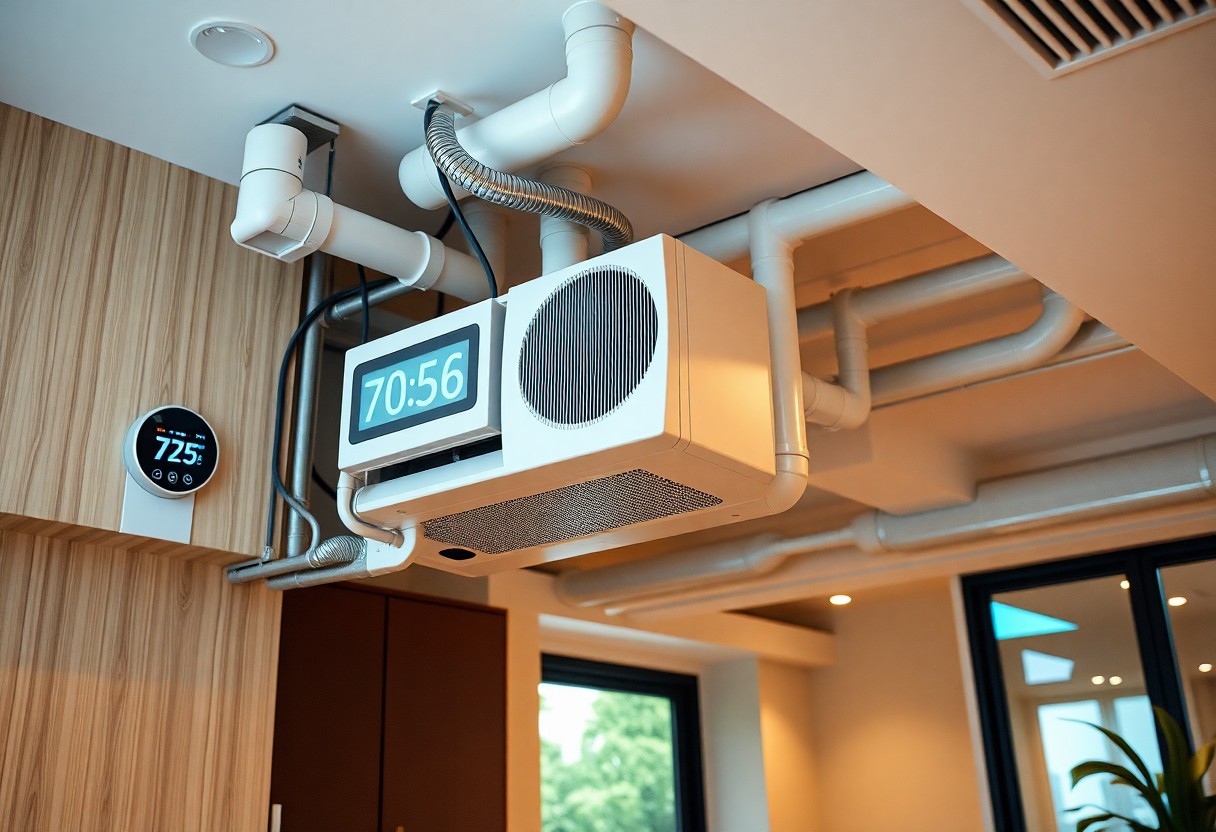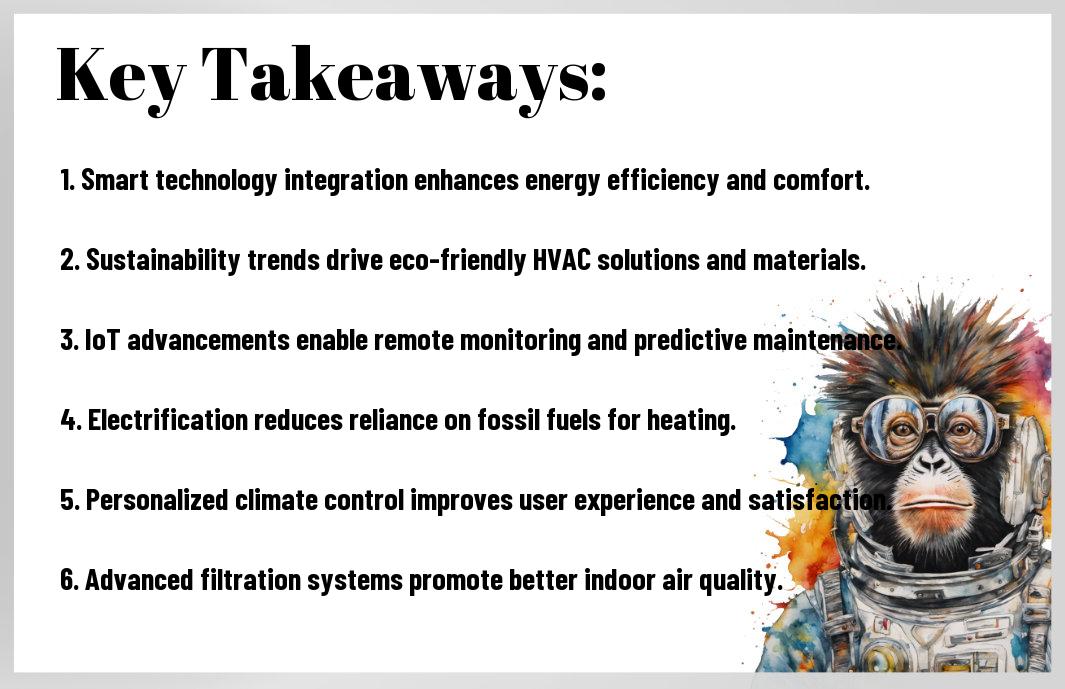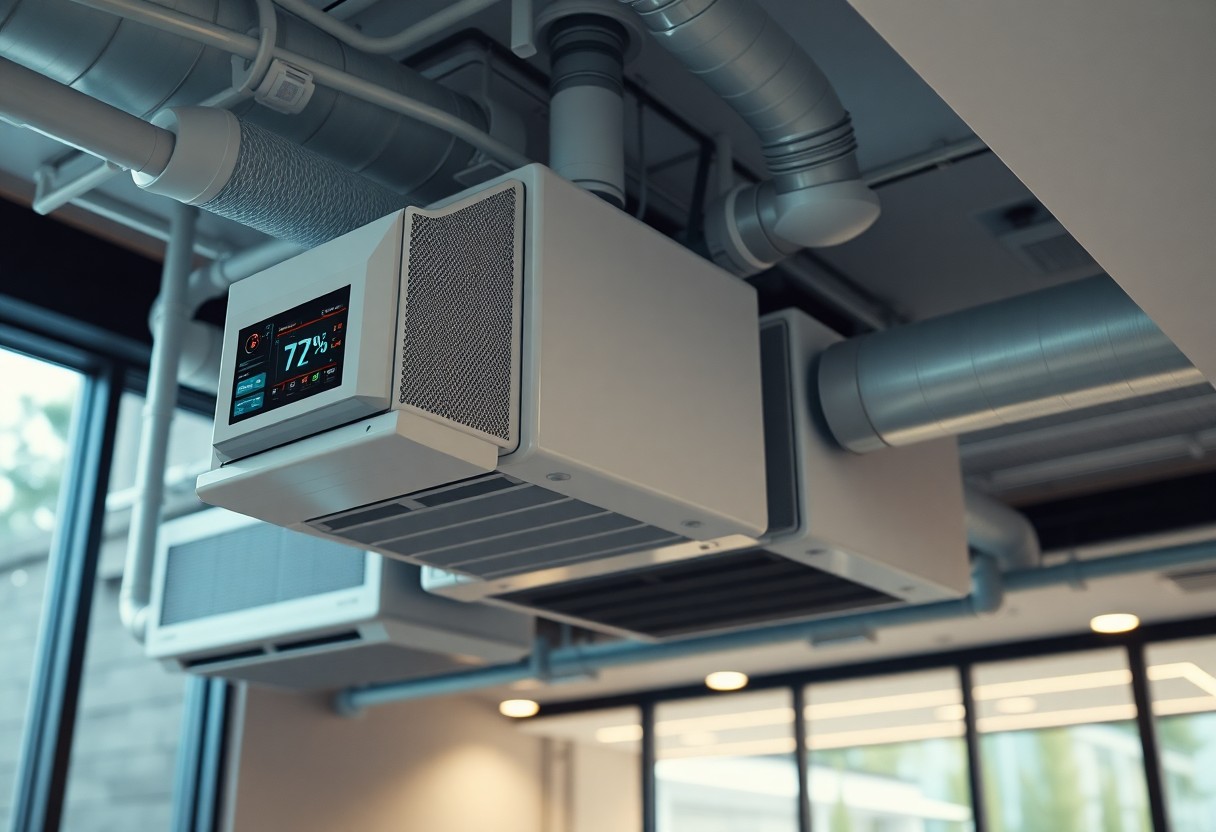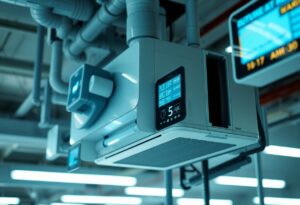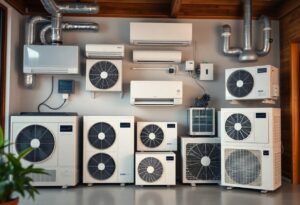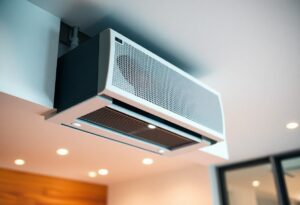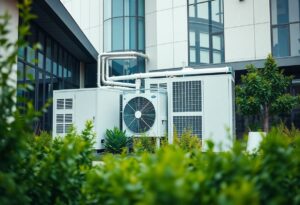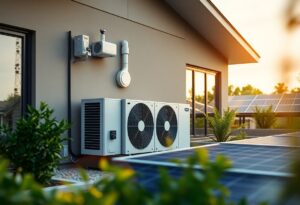Many experts agree that the landscape of HVAC systems is evolving rapidly, bringing innovative technologies and sustainable practices to the forefront of industry trends that will shape 2025. As you navigate this changing terrain, it’s crucial to understand how smart systems, energy efficiency, and air quality improvements can enhance your comfort and indoor environment while reducing your carbon footprint. Stay informed and equipped to embrace these advancements, ensuring that you’re prepared for a future where HVAC technology keeps pace with your needs.
Key Takeaways:
- Increased focus on energy efficiency and sustainability will guide HVAC advancements, leading to enhanced system designs.
- The integration of smart technology and IoT will enable real-time monitoring and control, optimizing performance and user convenience.
- Regulatory changes will promote the use of eco-friendly refrigerants, pushing manufacturers towards greener alternatives.
- Personalization in climate control solutions will gain traction, allowing users to tailor settings to specific preferences and needs.
- Decentralized systems and zoning technologies will emerge, providing more versatile and efficient climate control options for both residential and commercial spaces.
- Advancements in predictive maintenance through AI and machine learning will reduce downtime and extend the lifespan of HVAC systems.
- Collaboration between HVAC manufacturers and renewable energy providers will create more integrated solutions, enhancing the overall effectiveness of climate control systems.
The Current State of HVAC Technology
Overview of Existing Systems
Current HVAC systems are designed to regulate indoor climate by heating, cooling, and ventilating spaces effectively. These systems range from traditional split systems to advanced ductless mini-splits and centralized units, each offering unique benefits tailored to different building types and consumer needs. You may often find that older systems tend to operate less efficiently, leading to increased energy consumption and costs, while newer technology emphasizes energy efficiency and smart capabilities.
As you explore different HVAC systems, pay attention to the integration of smart technology that connects these units to your home or building management system. Systems equipped with smart thermostats and energy monitoring capabilities allow for greater control and automation, enabling you to optimize energy use based on your schedule and preferences. This modern approach not only enhances comfort but also helps in reducing environmental impact through lowered energy consumption.
Market Analysis and Consumer Preferences
Current market trends indicate a growing demand for energy-efficient HVAC systems that incorporate advanced technology. As consumers become more aware of the environmental impact of their choices, you may notice a shift towards systems that not only help in reducing operational costs but also contribute to sustainability. Manufacturers are now focusing on developing products that appeal to this environmentally conscious demographic, often prioritizing the use of eco-friendly refrigerants and sustainable materials.
In fact, market research shows that over 75% of consumers are willing to invest in energy-efficient HVAC solutions if it means reducing their utility bills and environmental footprint. Additionally, you might consider that the preference for smart systems is on the rise, with many homeowners looking for technologies that allow for remote monitoring and control of their HVAC units via mobile apps. This growing inclination towards technology-driven solutions reflects a broader trend of seeking convenience and efficiency in home management.
Emerging Technologies in HVAC
While the HVAC industry continues to evolve, innovative technologies are paving the way for a more efficient and effective future. With the increasing necessity for climate control and energy efficiency, staying informed about these trends will empower you to make the best decisions for your home or business. You can expect more systems that integrate comfort, sustainability, and automation, enhancing not only the functionality of HVAC systems but also their adaptability to changing circumstances and consumer preferences.
Smart and Connected Systems
Against the backdrop of rapid technological advancements, smart and connected HVAC systems are transforming the way you interact with climate control in your space. These systems utilize Internet of Things (IoT) technology to connect multiple devices, allowing you to monitor and manage your HVAC settings remotely through smartphones or tablets. The convenience is unparalleled—not only do you gain control over your environment, but the integration of advanced sensors and machine learning algorithms also optimizes performance based on your habits and preferences.
Energy Efficiency Innovations
Along with smart technology, energy efficiency innovations are becoming a game changer in the HVAC sector. You will find that emerging systems are designed to consume less energy while still providing exceptional indoor comfort. This is achieved through various innovations, including variable-speed compressors and advanced heat pump technology, which adapt more readily to your needs. Such efficiencies can lead to substantial reductions in your utility bills and your overall carbon footprint.
Considering the significance of reducing energy consumption, these efficiency innovations are not only beneficial for your wallet but also for the environment. They highlight new materials that trap heat during winter and release it during summer, creating a balance that reduces energy demand. As you look forward to the future of HVAC in 2025, embracing these advanced technologies is a positive step toward achieving sustainable and cost-effective climate control in your space.
Sustainability Trends
Unlike previous decades where HVAC systems were primarily focused on efficiency, the modern landscape is seeing an increasing demand for sustainability in heating, ventilation, and air conditioning solutions. As an informed consumer, you are likely keenly aware of the need to minimize environmental impact while ensuring your home remains comfortable. Innovations in this sector are now heavily influenced by the drive toward reducing carbon footprints, which means that manufacturers are adapting their products to align with green building standards and local environmental regulations. This shift suggests not only a better planet but potentially lower operational costs for you as a homeowner.
Eco-friendly Refrigerants
Besides shifting towards energy-efficient systems, a significant focus within the HVAC industry is the development and adoption of eco-friendly refrigerants. Traditional refrigerants, like R-22, are notorious for depleting the ozone layer and contributing to global warming. As a responsible consumer, you’ll want to pay attention to systems that utilize refrigerants with a lower global warming potential (GWP), such as R-32 or R-454B. These alternatives are not only more sustainable, but they also promise improved efficiency, ultimately benefiting both the planet and your utility bill.
Renewable Energy Integration
Above all, the integration of renewable energy sources within HVAC systems is a trend you’ll want to consider. This approach enhances the overall sustainability and efficiency of heating and cooling systems. By combining your HVAC unit with renewable technologies such as solar panels or wind turbines, you can significantly reduce your reliance on fossil fuels and decrease your carbon footprint. The move towards renewables also means you benefit from lower energy costs and the potential for energy independence, making this integration a smart choice for future-proofing your home.
Also, the rise of smart grid technology complements renewable energy integration well. As you adopt smart thermostats and connected HVAC systems, you are not just optimizing energy use in real-time but also participating in demand response programs that allow you to sell back excess energy to your local grid. This not only enhances your home’s energy efficiency but also opens new avenues for financial savings or even profit. Embracing these sustainable trends positions you at the forefront of conscious living and responsible energy use.
Impact of Government Regulations
Now, navigating the landscape of HVAC in the coming years will heavily depend on your understanding of government regulations. These regulations are being implemented to ensure environmental compliance and enhanced energy efficiency. As consumer preferences increasingly lean towards sustainable solutions, you will find that these regulations are shaping the technologies and systems available in the market, emphasizing the urgent need for innovation in HVAC practices.
Energy Codes and Standards
After years of development, energy codes and standards are evolving at a rapid rate to meet the demands of climate change initiatives and energy efficiency goals. This means that, as a homeowner or business owner, you will likely experience changes in how HVAC systems are designed and installed. Compliance with these energy codes can affect everything from equipment efficiency ratings to proper insulation in buildings, compelling you to consider adopting modern solutions that sync with these evolving mandates.
Incentives for Green Technology Adoption
Below, it’s necessary for you to explore the financial incentives offered by government programs to encourage the adoption of environmentally friendly HVAC technologies. Many federal and state initiatives provide tax credits, rebates, and other benefits for upgrading to high-efficiency systems or integrating renewable energy sources like solar power into your heating and cooling solutions. Taking advantage of these incentives can significantly offset your initial investment and accelerate your return on investment.
Understanding the landscape of these incentives is vital as they can drastically impact your decision-making process. As policies evolve, you might discover that the financial support for adopting green technologies not only lessens the burden of costs but also enhances the overall performance of your HVAC systems. By aligning your choices with these governmental benefits, you can ensure that your investments in HVAC systems are both economical and environmentally friendly, paving the way for a sustainable future.
The Role of IoT in HVAC
After exploring various advancements in HVAC technology, you will find that the integration of the Internet of Things (IoT) plays a transformative role in how you manage climate control in your space. The IoT creates a network of interconnected devices that can communicate with each other and with you, allowing for a more efficient and user-friendly HVAC experience. With smart thermostats, sensors, and monitoring systems, you can expect improved energy efficiency, enhanced comfort, and greater control over your environment.
Remote Monitoring and Control
Monitoring your HVAC system remotely has become not only feasible but also highly beneficial for individuals and businesses alike. By utilizing IoT-enabled devices, you can track performance metrics in real-time, receive alerts about system malfunctions, and make adjustments to your settings, all from the convenience of your smartphone or computer. This capability means you are no longer tied to manual controls; you can optimize your system’s energy usage and performance at any time and from anywhere.
Predictive Maintenance Benefits
After implementing IoT technology in your HVAC systems, you can significantly enhance your maintenance practices through predictive approaches. Rather than relying solely on scheduled maintenance checks, IoT devices analyze data collected from your system to identify potential issues before they escalate. This predictive maintenance not only minimizes unplanned downtime but also extends the lifespan of your equipment, saving you both time and money in the long run.
Even more compelling is the potential for cost savings that predictive maintenance brings to your operation. By addressing issues proactively, you can avoid costly repairs and minimize energy waste. Additionally, your HVAC system will run more efficiently, which directly translates to lower utility bills. Embracing this technology allows you to create a more reliable environment, ensuring your comfort while also promoting sustainability by reducing energy consumption.
Forecasting the HVAC Market by 2025
Projected Growth and Trends
Along with the increasing demand for energy-efficient solutions, the HVAC market is projected to experience significant growth by 2025. You can expect the global HVAC market to reach an estimated value of over $240 billion, driven by factors such as urbanization, climate change, and stricter government regulations aimed at reducing carbon emissions. This growth is not just numbers; it reflects a shift towards advanced technologies that cater to both sustainability and consumer comfort.
Moreover, you should keep an eye on trends like the rise of smart HVAC systems that integrate seamlessly with Internet of Things (IoT) devices, allowing for remote monitoring and increased energy efficiency. The adoption of variable refrigerant flow (VRF)</strong) systems and smart thermostats are likely to become commonplace, making your HVAC experience not only more efficient but also smarter. The competitive landscape will evolve, urging you as a consumer to consider systems that offer long-term savings while promoting healthier indoor air quality.
Key Players and Competitive Landscape
Above all, the HVAC industry is shaped by leading companies that continually innovate to maintain their market positions. You should be aware that major players like Carrier, Trane Technologies, and Lennox International are investing heavily in research and development, focusing on sustainable technology solutions. Their strategies often include partnerships and mergers, further intensifying the competitive landscape. As you navigate the market, it’s vital to recognize these key players and the impact they have on the availability of advanced HVAC options.
With the ongoing global push towards sustainability, these companies are not merely competing with one another; they’re also addressing your concerns about energy consumption and environmental impact. They are likely to introduce products that highlight renewable energy integration and intelligent systems for better user control. Staying informed about their technological advancements will allow you to make educated decisions when it comes to purchasing HVAC equipment that meets both your comfort needs and your commitment to environmental responsibility.
Final Words
As a reminder, the future of HVAC systems is evolving rapidly, and staying informed about the best trends shaping 2025 can significantly impact your comfort and efficiency at home or in your business. By embracing advanced technologies like smart thermostats, energy-efficient systems, and integrated IoT solutions, you can optimize your HVAC performance and reduce operational costs. These innovations allow you to gain better control over your environment while minimizing energy consumption, ultimately benefiting both your pocketbook and the planet.
Adopting these emerging trends not only enhances your indoor climate but also aligns your choices with sustainable practices. As you look to the future, consider investing in HVAC systems and practices that embrace these advancements. Doing so will prepare you for the inevitable changes in the industry, ensuring that you remain at the forefront of efficiency, comfort, and sustainability well into the future.
FAQ
Q: What are the key trends shaping the HVAC industry in 2025?
A: Some of the key trends include increased adoption of smart technology, enhanced energy efficiency standards, the integration of renewable energy sources, the rise of indoor air quality solutions, and the use of advanced data analytics for system optimization. These trends reflect a shift towards sustainability and improved user comfort.
Q: How is smart technology influencing HVAC in 2025?
A: Smart technology is revolutionizing HVAC systems by enabling remote monitoring and control through smartphones or tablets. Systems equipped with IoT sensors can adjust settings based on real-time data, optimizing energy consumption and enhancing comfort. The integration of machine learning can also allow systems to improve over time based on usage patterns.
Q: What impact will energy efficiency regulations have on HVAC systems by 2025?
A: Stricter energy efficiency regulations will compel manufacturers to develop HVAC systems that consume less energy while maintaining performance. Expect advancements in variable refrigerant flow systems and high-efficiency heat pumps. These regulations will not only help in reducing energy bills for consumers but also contribute to a decrease in overall carbon emissions.
Q: How are renewable energy sources integrated into HVAC systems?
A: In 2025, there’s a growing trend of integrating renewable energy sources, such as solar or wind power, with HVAC systems. For example, HVAC systems may use solar panels to power heat pumps or other components, enhancing energy independence and reducing reliance on fossil fuels. This integration aligns with goals for sustainability in the built environment.
Q: Why is indoor air quality becoming a focus in HVAC systems?
A: Indoor air quality is gaining importance due to heightened awareness of health and environmental issues. HVAC systems in 2025 will increasingly include filtration systems, air purifiers, and humidity controls to create healthier indoor environments. Improved air quality is linked to better health outcomes, especially in residential and commercial spaces.
Q: How will data analytics play a role in the future of HVAC?
A: Data analytics will be integral for optimizing HVAC performance by predicting maintenance needs, enhancing system efficiency, and improving response times to faults. By analyzing usage data, HVAC systems can adapt to changing conditions, ensuring optimal operation while minimizing energy consumption and downtime.
Q: What should consumers look for when choosing HVAC systems in 2025?
A: Consumers should prioritize systems featuring smart technology, high energy efficiency ratings, and advanced air quality features. Additionally, considering systems that can seamlessly integrate with renewable energy sources and offer customizability through data analytics will ensure long-term value and comfort in their homes or workplaces.
This post has been written by Team HVAC Talk Magazine. Stay informed and connected with the latest in HVAC—join us for expert advice, troubleshooting tips, and news updates. Don’t miss out, follow us now! #HVACExperts #HVACTips #StayInformed #HVACProTalk.
Learn more and join our mailing list for updates.
